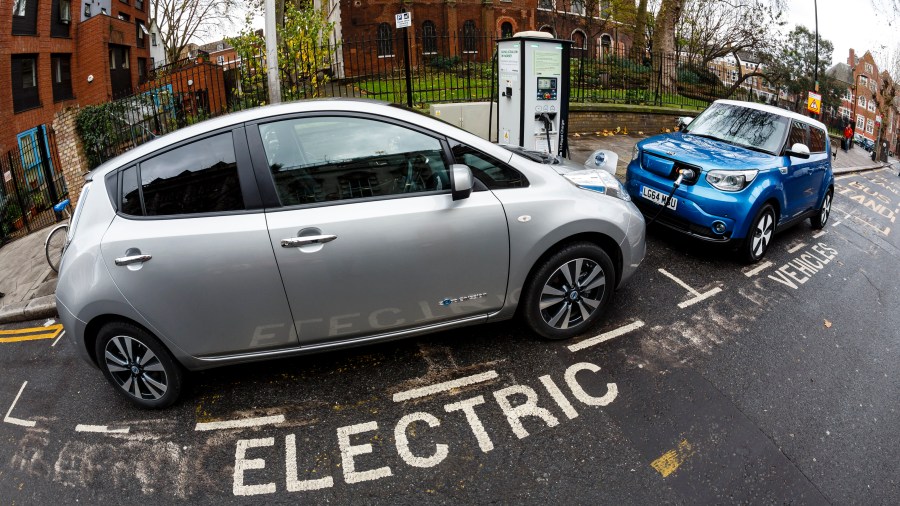Electric vehicles are getting noisier, for safety’s sake

This episode was originally published on July 15, 2019
One of the strangest things to get used to about electric vehicles is how quiet they are. It makes you realize how much we associate engine noise with driving. That lack of sound can be problematic — even deadly. Think about the visually impaired or anyone oblivious to vehicles because they’re staring at their smartphones.
In the European Union, new models of electric vehicles must make some sort of noise to address those safety concerns. Some carmakers are already doing that, and they’re taking it as an opportunity to craft signature sounds. Marketplace’s Jed Kim spoke with BBC journalist Chris Vallance, who reported about some of the things designers need to think about when making new car sounds. The following is an edited transcript of their conversation.
Chris Vallance: The No. 1 consideration is that this [sound] tells you something is coming, that there is a car on its way. But, of course, like everything in car manufacture, from the cup holders to the keys, it’s a chance to say something about the brand. A few manufacturers have been doing this for a while ahead of rules that are going to require all new electric models in Europe to have what they call the acoustic vehicle alert systems. I went and visited Jaguar, which is a car manufacturer with long roots in the U.K., because they’d already put one of these systems in their new electric SUV, the Jaguar I-Pace.
Jed Kim: And we have the sound of the I-Pace. You collected it.
Vallance: The sound has gone through a pretty lengthy development process before it hit the roads. Interestingly, the sound design process starts before the visuals of the car are finalized. They start kind of like mood boards and then they try out the sounds.
I think one of the initial sounds they came up with was a flying saucer sound, and that was problematic because they said that people wouldn’t look. They’d be looking at the sky, because what does a flying saucer sound like? So they tried other sounds. Some were a little bit too futuristic, like the synthetic engine sound. There are other sounds that are layers that they then build up the finish sound from. So I rather like the one, which I thought was a bit like the deck of the [“Star Wars”] Star Destroyer. But they thought it was a bit more positive. So let’s say it’s the engine of the Millennium Falcon.
Kim: Are there any rules or regulations limiting the sounds that cars will be able to make?
You’re not going to get the hamster dance from cars anytime soon.
Chris Vallance
Vallance: Yeah, there are. There are lots of rules and regulations. They talk about the restrictions on frequencies. They specifically rule out some sounds, like, as memory serves, random sounds like waterfall sounds. It can’t just be anything. You’re not going to get the hamster dance from cars anytime soon.
Related links: more insight from Jed Kim
If you value peace and quiet, you may be glad to know that BMW is installing 100 electric vehicle charging stations at, or near, national parks. It helps address the problem of electric car charging being too concentrated in certain areas but absent from remote places.
Need proof that carmakers are really investing in sound? BMW is partnering with Hans Zimmer, the score composer for movies like “Inception.” He’s composing the sounds for BMW IconicSounds Electric, the company’s sound brand. TechCrunch has more on the partnership. And there’s a video featuring the sound he made for one of BMW’s concept cars. The video is appropriately weird.
Korean automaker Hyundai is the first to release a mass-market electric vehicle in India. Bloomberg said the Kona SUV will start retailing for 2.5 million Indian rupees — that’s about $36,000. Up to this point, India has been the last major market without a real all-electric vehicle for everyday consumers. The Indian government is making a push to reduce the pollution that plagues the country.
The future of this podcast starts with you.
Every day, the “Marketplace Tech” team demystifies the digital economy with stories that explore more than just Big Tech. We’re committed to covering topics that matter to you and the world around us, diving deep into how technology intersects with climate change, inequity, and disinformation.
As part of a nonprofit newsroom, we’re counting on listeners like you to keep this public service paywall-free and available to all.
Support “Marketplace Tech” in any amount today and become a partner in our mission.
















